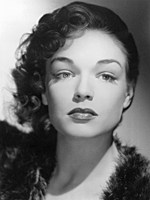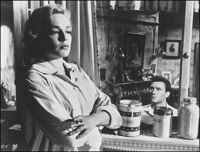Simone Signoret
| Simone Signoret | |
|---|---|
 |
|
| Born | Simone Henriette Charlotte Kaminker 25 March 1921 Wiesbaden, Germany |
| Died | 30 September 1985 (aged 64) Auteuil-Anthouillet, France |
| Occupation | Actress |
| Years active | 1942–1985 |
| Spouse | Yves Allégret (1944-1949) Yves Montand (1951-1985) |
Simone Signoret (French pronunciation: [simɔn siɲɔˈʁɛ]; 25 March 1921 – 30 September 1985) was a French cinema actress often hailed as one of France's greatest movie stars. She became the first French person to win an Academy Award, for her role in Room at the Top (1959). In her lifetime she also received a BAFTA, an Emmy, Golden Globe, Cannes Film Festival recognition and the Silver Bear for Best Actress.
Contents |
Early life
Signoret was born Simone Henriette Charlotte Kaminker in Wiesbaden, Germany to André and Georgette (Signoret) Kaminker as the eldest of three children, with two younger brothers. Her father, a pioneering interpreter who worked in the League of Nations, was a French-born Jewish army officer of Polish descent,[1] who brought the family to Neuilly-sur-Seine on the outskirts of Paris. Her mother Georgette, from whom she acquired her stage name, was a French Catholic[2]. Signoret grew up in Paris in an intellectual atmosphere and studied the English language in school, earning a teaching certificate. She tutored English and Latin and worked part-time as a typist for a French collaborationist newspaper, Les nouveaux temps, run by Jean Luchaire.
Career
During the German occupation of France, Signoret mixed with an artistic group of writers and actors who met at a café in the Saint-Germain-des-Prés quarter, Café de Flore. By this time, she had developed an interest in acting and was encouraged by her friends, including her lover, Daniel Gélin, to follow her ambition. In 1942, she began appearing in bit parts and was able to earn enough money to support her mother and two brothers as her father, who was a French patriot, had fled the country in 1940 to join General De Gaulle in England. She took her mother's maiden name for the screen to help hide her Jewish roots.
Signoret's sensual features and earthy nature led to type-casting and she was often seen in roles as a prostitute. She won considerable attention in La Ronde (1950), a film which was banned briefly in New York as immoral. She won further acclaim, including an acting award from the British Film Academy, for her portrayal of another prostitute in Jacques Becker's Casque d'or (1951). She appeared in many notable films in France during the 1950s, including Thérèse Raquin (1953), directed by Marcel Carné, Les Diaboliques (1954), and Les Sorcières de Salem (1956), based on Arthur Miller's The Crucible.

In 1958, Signoret acted in the English set Room at the Top (1959), which won her numerous awards including the Best Female Performance Prize at Cannes and the Academy Award for Best Actress. She was the only French cinema actress to receive an Oscar until Juliette Binoche in 1997 (Supporting Actress) and Marion Cotillard in 2008 (Best Actress), and the first woman to win the award appearing in a foreign film. She was offered films in Hollywood, but turned them down and continued to work in France and England. She played opposite Laurence Olivier in Term of Trial (1962). She did work in America for Ship of Fools (1965), which earned her another Oscar nomination, and appeared in a few other Hollywood films before returning to France in 1969.
Her one attempt at Shakespeare, performing Lady Macbeth opposite Alec Guinness at the Royal Court Theatre in London in 1966 proved to be ill-advised, although some critics were harsher and one referred to her English as "impossibly Gallic".[3]
In her later years, she was often criticized for gaining weight and letting her looks go, but Signoret, who was never concerned with glamour, ignored the insults and continued giving finely etched performances. She won more acclaim for her portrayal of a weary madam (Madame Rosa) in La Vie devant soi (1977) and as an unmarried sister who unknowingly falls in love with her paralyzed brother via anonymous correspondence in I Sent a Letter to my Love (1980).
Her memoirs, Nostalgia Isn't What It Used To Be, were published in 1978. She also wrote a novel, Adieu Volodya, published in 1985, the year of her death.
First married to the filmmaker Yves Allégret (1944–49), with whom she had a daughter Catherine Allégret, herself an actress. Her second marriage was to the Italian-born French actor Yves Montand in 1950, a union which lasted until her death.
She died of pancreatic cancer in Auteuil-Anthouillet, France; and is buried in Père Lachaise Cemetery in Paris.
The late, legendary American jazz musician, pianist, singer and composer Nina Simone took her stage name from Signoret.
Filmography
| Year | Film | Role | Notes |
|---|---|---|---|
| 1942 | Boléro | Une employée de maison de couture | uncredited |
| Les Visiteurs du soir | Extra | uncredited | |
| Le Prince charmant | |||
| 1943 | Adieu Léonard | La gitane | uncredited |
| Le Voyageur de la Toussaint | Extra | uncredited | |
| 1944 | L'Ange de la nuit | Une étudiante | uncredited |
| Le Mort ne reçoit plus | La maitresse de Firmin | ||
| Service de nuit | La danseuse à la taverne | ||
| Béatrice devant le désir | |||
| 1945 | La Boîte aux rêves | Une femme | uncredited |
| 1946 | Macadam | Gisèle | |
| Le Couple idéal | Annette | ||
| Les Démons de l'aube | Lily, la cabaretière | ||
| 1947 | Fantômas | Hélène | |
| 1948 | Impasse des deux anges | Marianne | |
| Dédée d'Anvers | Dédée | ||
| Against the Wind | Michele Dennis | ||
| 1950 | Manèges | Dora | |
| Gunman in the Streets | Denise Vernon | a French version was also filmed as Le Traqué | |
| La Ronde | Leocadie, the Prostitute | ||
| Swiss Tour | Yvonne | ||
| 1951 | Ombre et lumière | Isabelle Leritz | |
| Sans laisser d'adresse | Une journaliste | uncredited | |
| 1952 | Casque d'or | Marie 'Casque d'Or' | BAFTA Award for Best Foreign Actress |
| 1953 | Thérèse Raquin | Thérèse Raquin | |
| 1955 | Mutter Courage und ihre Kinder | Yvette, Lagerhure | |
| Les Diaboliques | Nicole Horner | Diabolique | |
| 1956 | Un matin comme les autres | Janine Alix | |
| La mort en ce jardin | Djin | ||
| 1957 | Les Sorcières de Salem | Elisabeth Procter | BAFTA Award for Best Foreign Actress |
| Die Windrose | |||
| 1959 | Room at the Top | Alice Aisgill | Academy Award for Best Actress BAFTA Award for Best Foreign Actress Cannes Film Festival Award for Best Actress National Board of Review Award for Best Actress Nominated — Golden Globe Award for Best Actress – Motion Picture Drama |
| 1960 | Adua e le compagne | Adua Giovannetti | |
| 1960 | Les Mauvais coups | Roberte | |
| Amours célèbres | Jenny | segment "Jenny de Lacour" | |
| 1961 | Barabbas | ||
| 1962 | Il Giorno più corto | Unconfirmed | |
| Term of Trial | Anna | ||
| 1963 | Dragées au poivre | Genevieve | |
| Le Jour et l'heure | Therese Dutheil | ||
| 1965 | Compartiment tueurs | Eliane Darès | |
| Ship of Fools | La Contessa | Nominated — Academy Award for Best Actress Nominated — BAFTA Award for Best Foreign Actress Nominated — Golden Globe Award for Best Actress – Motion Picture Drama |
|
| 1966 | Paris brûle-t-il? | La patronne du bistrot/Cafe Owner | Is Paris Burning? |
| The Deadly Affair | Elsa Fennan | Nominated — BAFTA Award for Best Actress in a Supporting Role | |
| 1967 | Games | Lisa Schindler | Nominated — BAFTA Award for Best Foreign Actress |
| 1968 | The Sea Gull | Arkadina, an actress | |
| 1969 | L'Américain | Léone | |
| Army of Shadows | Mathilde | ||
| Mr. Freedom | uncredited cameo | ||
| 1970 | L'Aveu | Mme L. aka Lise London | |
| 1971 | La Veuve Couderc | Veuve Couderc Tati | |
| Le Chat | Clémence Bouin | Silver Bear for Best Actress at the 21st Berlin International Film Festival[4] | |
| Comptes à rebours | Léa | ||
| 1973 | Rude journée pour la reine | Jeanne | |
| Les Granges brulées | Rose | ||
| 1975 | La Chair de l'orchidée | Lady Vamos | |
| 1976 | Police Python 357 | Thérèse Ganay | |
| 1977 | La Vie devant soi | Madame Rosa | César Award for Best Actress David di Donatello for Best Foreign Actress |
| 1978 | Judith Therpauve | Judith Therpauve | |
| 1979 | L'Adolescente | Mamie | |
| 1980 | Chère inconnue | Louise | |
| 1982 | Guy de Maupassant | Maupassant's mother | |
| L'étoile du nord | Mme Louise Baron | Nominated — César Award for Best Actress |
Television award
- 1966: Won Emmy Outstanding Single Performance by an Actress in a Leading Role in a Drama for: Bob Hope Presents the Chrysler Theatre (1963) for episode A Small Rebellion
See also
- Cinema of France
- César Award for Best Actress
References
- ↑ Nostalgia Isn't What It Used to Be (Paperback) was descended from Polish Jews. Film Guardian.co.uk. 7 August 2000.
- ↑ SImone Signoret - Women's Studies
- ↑ Sutcliffe, Tom. Sir Alec Guiness. Film Guardian.co.uk. 7 August 2000.
- ↑ "Berlinale 1971: Prize Winners". berlinale.de. http://www.berlinale.de/en/archiv/jahresarchive/1971/03_preistraeger_1971/03_Preistraeger_1971.html. Retrieved 2010-03-14.
Bibliography
- Monush, Barry (ed), The Encyclopedia of Hollywood Film Actors From the Silent Era to 1965. New York: Applause Books, 2003. ISBN 1-55783-551-9
- Signoret, Simone, Nostalgia Isn't What It Used To Be. Weidenfeld and Nicolson, 1978. ISBN 0-297-77417-4
External links
- Simone Signoret at the Internet Movie Database
- Simone Signoret at Allmovie
- Simone Signoret at Yahoo! Movies
- Simone Signoret at Find a Grave
|
|||||||||||||||||||||||||||||||||||||